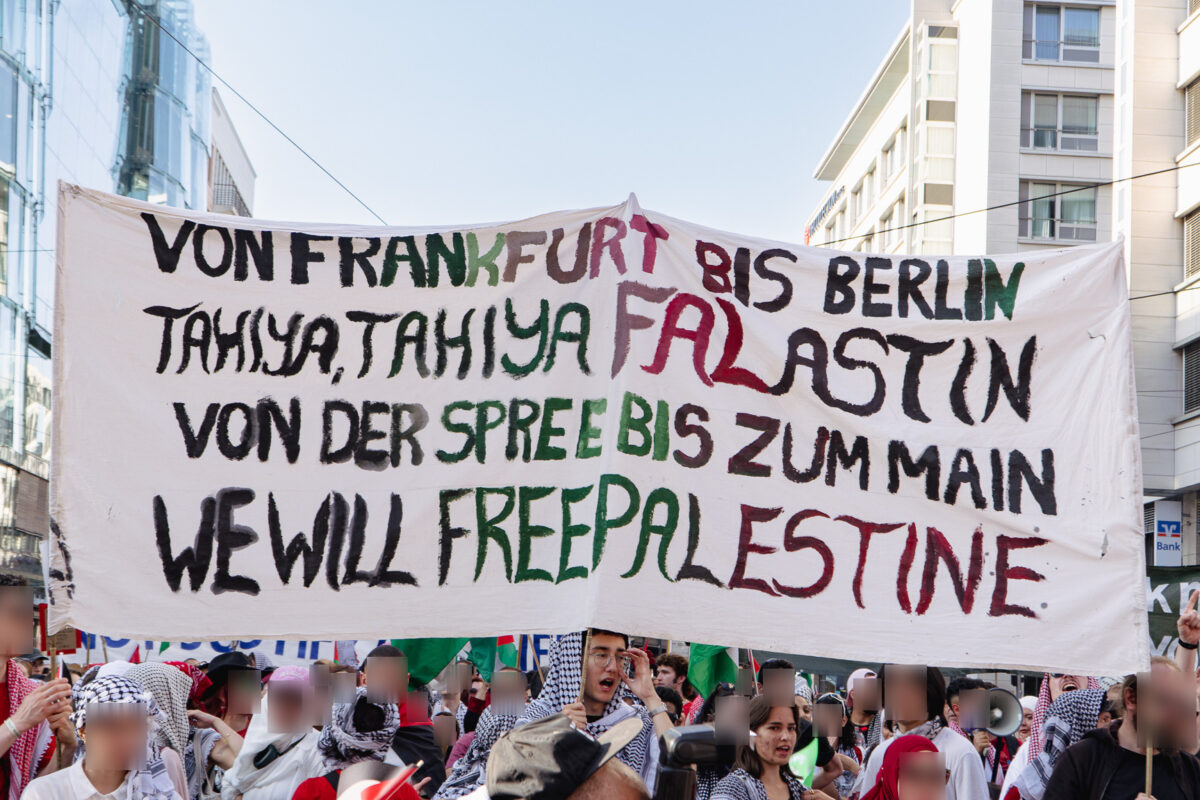The residents of Neukölln’s Donaustrasse 107 were in fighting spirit. While they saw off the gloomy weather hanging over their garden party with Glühwein and colourful cakes, they also had a bigger problem to contend with: the grim prospect of falling into the hands of the Scandinavian housing company Heimstaden.
“It’s not just about this one house, it’s about the sell-off of the cities. Buildings are the new gold,” said one of the tenants, who called herself Lila Fuchs.
Her house is one of 130 which, at the end of September, Heistaden announced it intends to buy. The company plans to spend €830m on a total of almost 4,000 flats.
The deal is so big that now Berlin’s governing Senate has got involved. A joint negotiation committee includes finance secretary Vera Junker (SPD), housing secretary Wenke Christoph (Die Linke), and urban development councillor Jochen Biedermann (Die Grüne). Their aim is to persuade Heimstaden to sign Abwendungsvereinbarungen – ‘avoidance agreements’. [These agreements allow the company to avoid the fate of having the sale blocked by the state, which has a right of first refusal (Vorkaufsrecht) under which it could step in and buy the houses into public ownership. In return the company has to make binding commitments to protect existing tenants — editor’s note.]
“Heimstaden has announced several times that it wants to be seen as a long-term owner and a good landlord in Berlin,” Wenke Christoph told ND. “By signing the Abwendungsvereinbarungen the firm can now put these words into action.”
Bernd Arts, a spokesperson for the company, said: “When purchasing residential buildings in Milieuschutz areas [designated neighbourhoods where special rules apply to protect existing tenants], Heimstaden is offering to sign wide-ranging Abwendungsvereinbarungen with the respective local authorities.
“Forthcoming discussions with politicians will show whether we’re going to find a solution that is acceptable for both sides,” he added.
The Green councillor Jochen Biedermann said that “so far there have been no offers that the district could accept.
“We’ll have to see what comes next,” said Biedermann.
Even exercising the right of first refusal over some smaller packages of buildings, which Heimstaden had already tried to buy this year, has not yet persuaded the company to compromise, according to the Green councillor.
“Central coordination [of the negotiations, which would otherwise be carried out separately by each district of the city] is a new way of doing things that will hopefully become a precedent,” said Gaby Gottwald, a Die Linke politician who sits on the housing committee in the German parliament.
“We mustn’t give an inch when it comes to Abwendungsvereinbarungen. If we start agreeing to special conditions for big institutional investors, we’ll destroy the power of the instrument.”
Katrin Schmidberger, the Green spokesperson for rented housing, said state-owned housing companies had a particular responsibility to make a contribution when it comes to the houses. “The whole governing coalition is now faced with the question of making new state money available,” she said, pointing out that the relevant pot is empty. Schmidberger said the coalition had to show that it “clearly rejects business models that are to the detriment of Berliners.”
In Neukölln alone, Heimstaden wants to buy 27 houses in Milieuschutz areas. For 16 of those, the deadline for the exercise of the right of first refusal is November 23rd. For the rest, there’s about a month more time.
“We suspect that part of the strategy of Heimstaden is to create uncertainty about the [Vorkaufsrecht] deadline,” said Luca Niefanger. “We are orientating ourselves around November 23rd.” He’s a spokesperson for the new coalition Stop Heimstaden, which is working on networking tenants across Berlin.
“It’s going quite impressively. The response is huge,” said Niefanger. Multiple demonstrations had been planned for the coming days. The biggest protest, which took place on Sunday in front of the main Berlin town hall, addressed not just Heimstaden but also the wider sell-off of cities.
“We demand the exercise of the right of first refusal and that politicians find solutions for all houses which are not covered by Milieuschutz,” said Niefanger. Indeed, only about half of the houses are able to benefit from Abwendungsvereinbarungen, he said.
There are, however, repeated examples of tenants winning the day. Take Mehringplatz, for example. On Monday, the state-owned housing company Howoge announced the acquisition of a high-rise complex from an investment fund run by the Luxembourg-based Optimum Asset Management SA.
“I opened a bottle of prosecco straight away,” tenant Daniela Berger told ND. After a negotiation process, a total of 372 flats at Mehringplatz 12-14, Friedrichstr. 246 and Wilhelmstr. 2-6 will now become property of the city. The tenants had alleged serious neglect of the buildings and many flats are said to have been left standing empty.
A delighted Pascal Meiser, a Die Linke parliamentarian said: “For the tenants around Kreuzberg’s Mehringplatz, who are in many respects in need of special protection, this decision finally brings security that they are not once again going to fall victim to ruthless profiteers.”
This report originally appeared in ND and is published here by kind permission of the author. Translation for The Left Berlin by Tom Wills.


